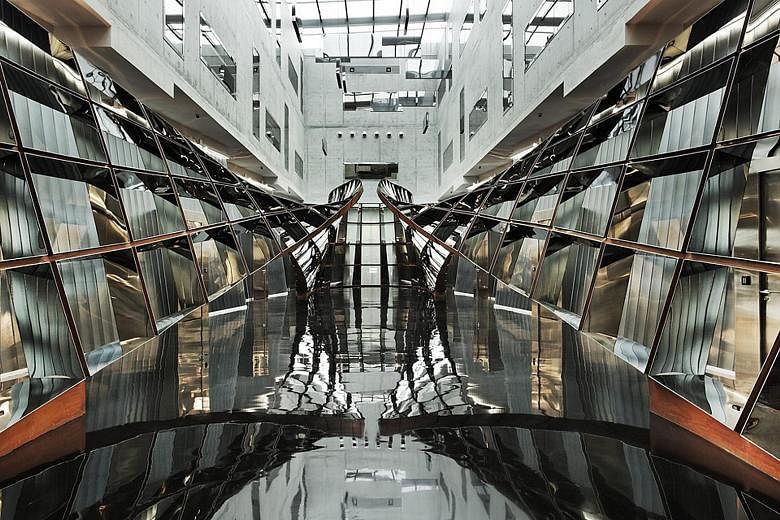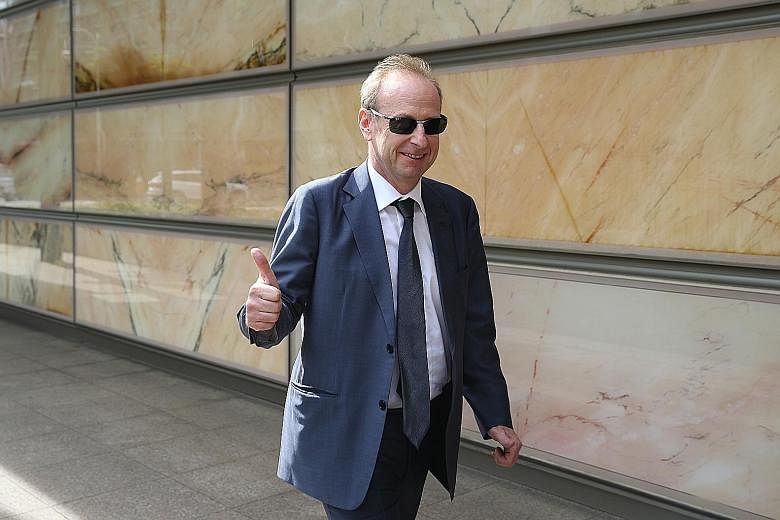Asia's "Fort Knox", a private, maximum-security vault in Singapore, is for sale. Le Freeport, a multi-storey repository for fine art, precious gems and even JPMorgan Chase & Co's stash of gold, has been seeking a buyer since as far back as 2017, so far without success, according to people familiar with the matter.
Owner Yves Bouvier, a Swiss art dealer, has been embroiled in a five-year legal brawl with a Russian billionaire and has been selling assets.
Opened in 2010 at a cost of about $100 million, the vault sits on a large tract of government land with direct access to the runways of Changi Airport. Formerly known as the Singapore Freeport, the building was heralded as part of the city state's effort to boost its wealth management industry and become a regional hub for luxury collectables and bullion trading. For a while, that worked.
Mr Bouvier's dispute with billionaire Dmitry Rybolovlev "brought some unwanted attention to the facility, but overall it remained the focal point of the gold industry in Singapore, both for institutional and for individual clients", said Mr Joshua Rotbart, who runs a Hong Kong-based logistics firm specialising in precious metals and has used the vault to store clients' assets since 2010.
The climate started to change a few years ago when China's clampdown on luxury spending and an economic slowdown in the region curbed demand for high-value items, while an exodus by many banks from their physical commodity business from 2014 reduced the need for bullion storage.
LOSING MONEY
The venture has lost money for about a decade. It reported accumulated losses of $18.4 million by the end of last year, according to filings to Singapore's Accounting and Corporate Regulatory Authority.
Le Freeport chief executive Lincoln Ng recently told at least one tenant that the facility is still for sale, but that its owner hasn't found a buyer, according to a source.
In an e-mailed response to questions about Le Freeport sent via a spokesman, Mr Bouvier declined to comment on whether the business was for sale.
He said: "(The) attacks by Mr Rybolovlev against me in various courts and in the media have had a very negative effect on my business operations worldwide, including on the Freeport in Singapore. Despite this, over the past decade, our vision for the Freeport in Singapore has been proven to be a great success."
Mr Ng also declined to comment on whether Le Freeport is seeking a buyer.
The operation has cut rental rates to entice new tenants, said two people familiar with the matter.
Anchor tenant Christie's International took the entire top floor when the building opened for Christie's Fine Art Storage Services. Asia Freeport Holdings Pte bought the unit last year and renamed it Fine Art Storage Service, staying on as a tenant, a spokesman for Bouvier said.
A buyer would inherit an outstanding debt to DBS Group Holdings, Singapore's largest bank, which stood at about $20 million as of last year.
Any sale would mark a further retreat for Mr Bouvier from his earlier plan to build a network of free ports in wealthy hot spots around the world. He has said that he abandoned plans to build a free port in Shanghai because of the negative publicity from his court case, and in late 2017 he sold his storage and moving company Natural Le Coultre to a French rival, including his minority stake in the Geneva Freeport, the world's largest. He remains the majority owner of his Luxembourg Freeport.
The Singapore Government provided support to the Freeport, with the National Heritage Board and the National Arts Council among the initial shareholders. Enterprise Singapore, a government agency, in 2014 said the facility provided Asia "with its own Fort Knox", a reference to the US Bullion Depository in Kentucky. The city-state aspired to be a regional gold-trading hub after the Government waived goods and service tax (GST) on investment-grade bullion in 2012.
JPMorgan, one of the world's largest gold traders, was among the initial customers, keeping precious metals in the vaults since the opening. UBS Group, Deutsche Bank and Australia and New Zealand Banking Group have also stored gold there, though Deutsche Bank said they are no longer customers and ANZ said it has suspended its physical precious metals custody service.
BORDERLESS CAGE
Anyone entering Le Freeport has to go through security checks and a body scan before proceeding into a long atrium dominated by a 38m-long sculpture of polished steel by Israeli artist Ron Arad called the Cage Without Borders.
The building, designed by Swiss architects Benedicte Montant and Carmelo Stendardo, includes energy-saving features such as vegetation-covered walls to help maintain temperature and humidity levels.
Surrounding the atrium are windowless corridors with rows of identical steel doors that house the private suites of the tenants. They include Malca-Amit Global, which handles logistics for diamonds and gold, art movers Helu-Trans Group and Stamford Cellars, according to Le Freeport's website.
Tenants can have goods delivered to the site directly from planes without having to pay GST. A special heavy-duty elevator at the rear of the building can transport gold directly to the basement vaults.
Secrecy over what was stored in the strongrooms has led to concern about the possible use of the facility for illicit purposes.
In 2015, Singapore imposed new obligations to prevent money laundering and terrorism financing on GST-exempt warehouses including those at the Freeport.
But a year later, the Paris-based Financial Action Task Force said that the Singapore authorities "did not demonstrate a comprehensive understanding of what activities were being undertaken" in the building.
Mr Bouvier said the Singapore operation employs a system "which allows for complete traceability for every item stored". He said the security and transparency provided by Le Freeport for both clients and the authorities has made it the world's largest facility dedicated to the storage of fine art and high value collectables.
Singapore Customs, which licenses companies storing goods at Le Freeport, said it imposes stringent requirements on the storage of high-value goods such as precious stones, and conducts regular checks at the companies' warehouses to ensure they comply with regulations.
BLOOMBERG


